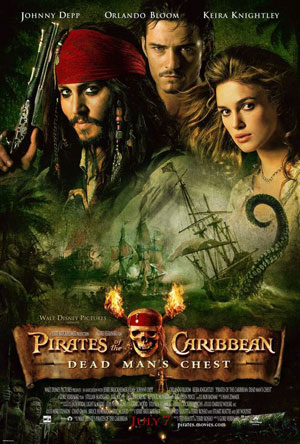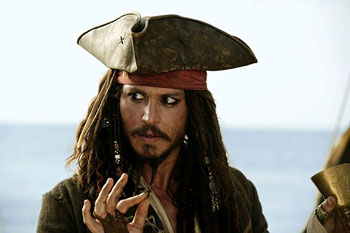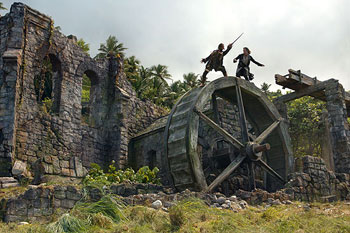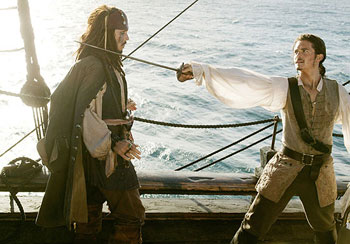 Sorry, Superman. This weekend Pirates of the Caribbean: Dead Man’s Chest will be your kryptonite. The buzz and excitement for the movie is approaching phenomenon levels – nerds even camped out last night to see the midnight show. And all of this came from a theme park ride.
Sorry, Superman. This weekend Pirates of the Caribbean: Dead Man’s Chest will be your kryptonite. The buzz and excitement for the movie is approaching phenomenon levels – nerds even camped out last night to see the midnight show. And all of this came from a theme park ride.
The guys who turned that theme park ride into a script came back for the sequels, which shot back to back (actually, still are shooting, as they tell me in this interview). Ted Elliott and Terry Rossio have put Captain Jack Sparrow and friends through the paces in Dead Man’s Chest, and a little birdie tells me that things will only get wilder with the next film.
I was able to carve out ten minutes on the phone with these guys a couple of weeks back, before I actually had a chance to see the film. But that was OK – what I was most interested in was the mechanics of writing something like this. Oh, and Godzilla.
Q: You’re writing two movies back to back. How do you split the action of the two films while making each feel like its own movie?
Rossio: You need to continue threads, storylines and character issues from film one and set up film three while at the same time feeling like a completed story is told in film two. We tried to do that by resolved some thematic issues and resolving the main storyline of two in a really decisive, hopefully unexpected way.
Elliott: We worked out the story for both of them before we began writing the actual screenplay for either two or three.
Q: Does it happen that Gore and the cast will find something on the set while shooting the second film that will send you scrambling back to the script for the third film to make it fit?
Elliott: That’s one of the fun parts of working in production, is actually seeing the scene up on its feet, how the directors are going to perform it, how the director is going to block it, how it’s going to be shot. Basically you’re looking for ways to tell the story through those elements.
Rossio: The more important process is that since we were working on 3 in the course of filming 3, if you discover something in 3 that needs to be filmed in 2, you better get it in there. There were some cases where on the day of shooting we discovered something in the  third movie that required a change that day over lunch of something that was going to be shot that afternoon.
third movie that required a change that day over lunch of something that was going to be shot that afternoon.
Elliott: There was one part where we were working on 3, a scene between Jack and Cutler Beckett, and we realized that the scene that had been blocked that morning had to be changed. A moment had to be played out much more fully than we had anticipated when we were writing the screenplay for 2.
Rossio: If you discover things in 2 that need to be in 3, you’re not really scrambling because you can take your time to get to it, but when the reverse happens that’s tricky.
Elliott: That’s when you’re running down to the ship!
Q: Does having seen what Johnny Depp did with his character in Black Pearl change the way you write Jack Sparrow in the sequels? How much leeway do you put in the script for Johnny to do his own thing?
Elliott: The weird thing in the first one is that the dialogue that Johnny performed was the dialogue we wrote for the most part but his performance was completely unanticipated. It was a very different performance than I imagined, but absolutely brilliant. What I found was that getting back to the voice of the character to write the dialogue was difficult because I had to actually stop thinking of Johnny’s performance until I got the dialogue written and then had to go back and adjust.
Rossio: There’s a bit of an art to it where you don’t want to write the dialogue the way the dialogue would be after he embellishes it, because it would be an embellishment on an embellishment. On the other hand you can anticipate where those embellishments are likely to be found and it’s like throwing the pass at the right moment so the shooter can hit the shot.
Q: How do you guys divide up the writing duties?
Rossio: Ted writes the difficult scenes. I do the easy ones.
Elliott: In fact the idea that working as partners you write 50/50 isn’t true – you both write 100%/100%. There is no division of duties.
Rossio: Each scene is rewritten thirty or forty times.
Q: Does having two writers help when you’re in an executive’s office or fighting with the director to keep a scene they want to cut or change?
the director to keep a scene they want to cut or change?
Rossio: Yeah, one of the biggest advantages is that when I’m talking Ted is strategizing and when Ted’s talking, I’m strategizing. And we like to sit well apart from each other so they have to flip their heads back and forth.
Elliott: The actual advantage is that we’ve already talked out the different ways to do the scene. Just between the two of us we have to figure out and come to a decision – as much as it’s inspiration or instinct – we have to be able to explain it reasonably to the other one if we have a disagreement. It’s basically working as a team.
Q: What’s the status on 3? Is it done shooting? Will there be reshoots or something?
Rossio: There’s never a reshoot because the schedules are such that by the time you finish the film is being released. For example this film was finally locked last Wednesday. What has been completed – obviously for the second movie and not so obviously the third – is the location shooting in the Caribbean. What’s left now were the scheduled stage work and non-Caribbean location stuff. That starts up late July and goes through August.
Q: Johnny says that he would be willing to come back for more films if there were good scripts. Would you guys be willing to write those scripts or have you gotten the pirates out of your system?
Elliott: If we come up with a good story we’d be happy to write more. But at this point let’s just finish 3, ok? [laughs]
 Rossio: The trilogy has been designed to feel complete with the story we’re telling. The world is an interesting world, and there’s the sense that there’s more to be discovered in that world. But for me I think after completing three stories it would be exploring different directions and different issues. More of a reinvention than a continuation.
Rossio: The trilogy has been designed to feel complete with the story we’re telling. The world is an interesting world, and there’s the sense that there’s more to be discovered in that world. But for me I think after completing three stories it would be exploring different directions and different issues. More of a reinvention than a continuation.
Q: I was watching TV the other day and I was surprised to see the American Godzilla appearing in a Doritos commercial.
Elliott: Yeah, what is up with that?
Q: I don’t know! It’s so strange. But I guess that this commercial signifies that someone is ready to forgive that movie somewhat. What’s your take on it now? Are there still hard feelings?
Elliott: I still Sony missed the boat when they didn’t make the Jan DeBont version of Terry and my screenplay. How’s that?
Rossio: Yeah, I think it’s pretty clear that everybody involved in that at this point – I think there’s a pretty strong consensus that they should have gone with our script.
Q: Do you feel vindicated about it now, or does it still sting as much?
Elliott: You know, it never really stings. Ultimately you’re working and the financier is the one who put all the money into it, and if they think X won’t make money and Y will… I just always look at it as, ‘Well, there went another opportunity to make a good movie.’
Rossio: I’m bothered by what I see as a repeating pattern. We have the ability to design a film based on some pretty sound theories and usually some pretty well-reasoned writing efforts. The studio will come in and empower different directors at different times and allow them to make contrary decisions that create films that are not successful. I don’t see the logic in that; it seems like they’re leaving hundreds of millions of dollars and dozens of quality films unearned and unmade. That’s bothersome. I don’t mind the fact that it’s happened in the past, but enough. Audiences want complex stories that are ambitiously told in a sort of adult way.
Elliott: It comes down to this: audiences are smarter than you think.
